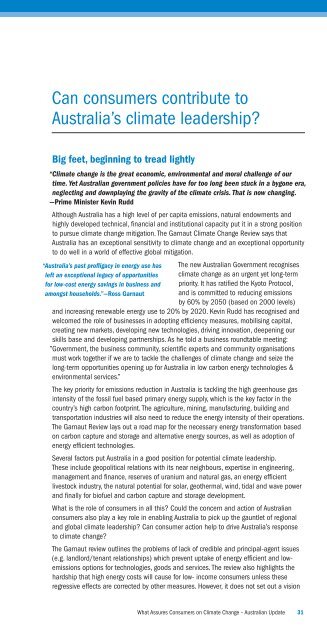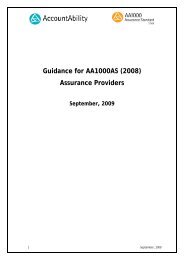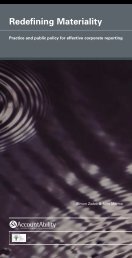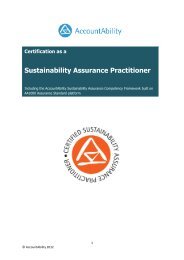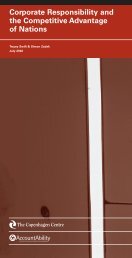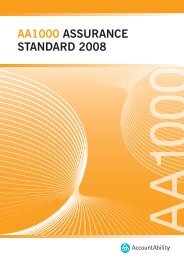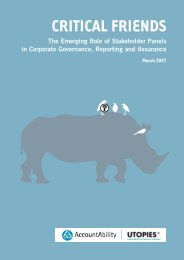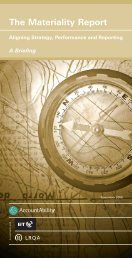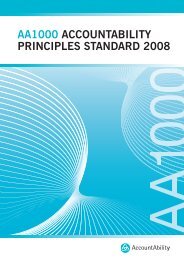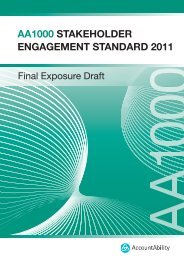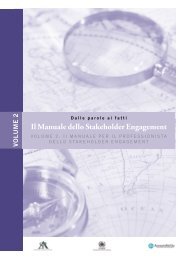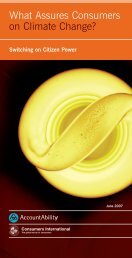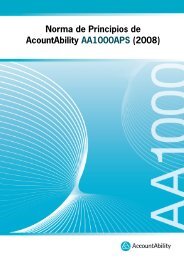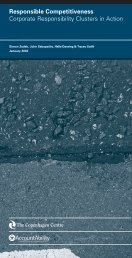Free Download - AccountAbility
Free Download - AccountAbility
Free Download - AccountAbility
- No tags were found...
You also want an ePaper? Increase the reach of your titles
YUMPU automatically turns print PDFs into web optimized ePapers that Google loves.
Can consumers contribute toAustralia’s climate leadership?Big feet, beginning to tread lightly“Climate change is the great economic, environmental and moral challenge of ourtime. Yet Australian government policies have for too long been stuck in a bygone era,neglecting and downplaying the gravity of the climate crisis. That is now changing.—Prime Minister Kevin RuddAlthough Australia has a high level of per capita emissions, natural endowments andhighly developed technical, fi nancial and institutional capacity put it in a strong positionto pursue climate change mitigation. The Garnaut Climate Change Review says thatAustralia has an exceptional sensitivity to climate change and an exceptional opportunityto do well in a world of effective global mitigation.“Australia’s past profligacy in energy use has The new Australian Government recognisesleft an exceptional legacy of opportunities climate change as an urgent yet long-termfor low-cost energy savings in business and priority. It has ratifi ed the Kyoto Protocol,amongst households.”—Ross Garnaut and is committed to reducing emissionsby 60% by 2050 (based on 2000 levels)and increasing renewable energy use to 20% by 2020. Kevin Rudd has recognised andwelcomed the role of businesses in adopting effi ciency measures, mobilising capital,creating new markets, developing new technologies, driving innovation, deepening ourskills base and developing partnerships. As he told a business roundtable meeting:”Government, the business community, scientifi c experts and community organisationsmust work together if we are to tackle the challenges of climate change and seize thelong-term opportunities opening up for Australia in low carbon energy technologies &environmental services.”The key priority for emissions reduction in Australia is tackling the high greenhouse gasintensity of the fossil fuel based primary energy supply, which is the key factor in thecountry’s high carbon footprint. The agriculture, mining, manufacturing, building andtransportation industries will also need to reduce the energy intensity of their operations.The Garnaut Review lays out a road map for the necessary energy transformation basedon carbon capture and storage and alternative energy sources, as well as adoption ofenergy effi cient technologies.Several factors put Australia in a good position for potential climate leadership.These include geopolitical relations with its near neighbours, expertise in engineering,management and fi nance, reserves of uranium and natural gas, an energy effi cientlivestock industry, the natural potential for solar, geothermal, wind, tidal and wave powerand fi nally for biofuel and carbon capture and storage development.What is the role of consumers in all this? Could the concern and action of Australianconsumers also play a key role in enabling Australia to pick up the gauntlet of regionaland global climate leadership? Can consumer action help to drive Australia’s responseto climate change?The Garnaut review outlines the problems of lack of credible and principal-agent issues(e.g. landlord/tenant relationships) which prevent uptake of energy effi cient and lowemissionsoptions for technologies, goods and services. The review also highlights thehardship that high energy costs will cause for low- income consumers unless theseregressive effects are corrected by other measures. However, it does not set out a visionWhat Assures Consumers on Climate Change – Australian Update 31


